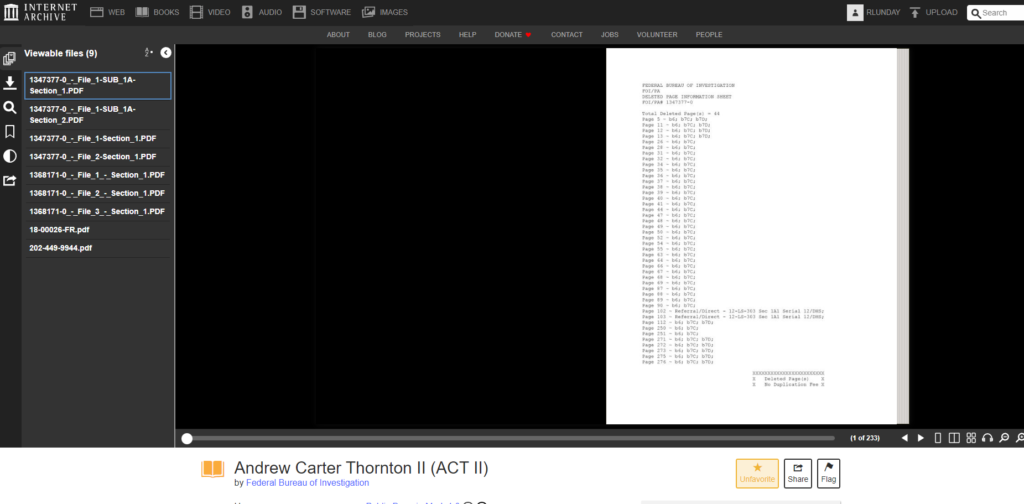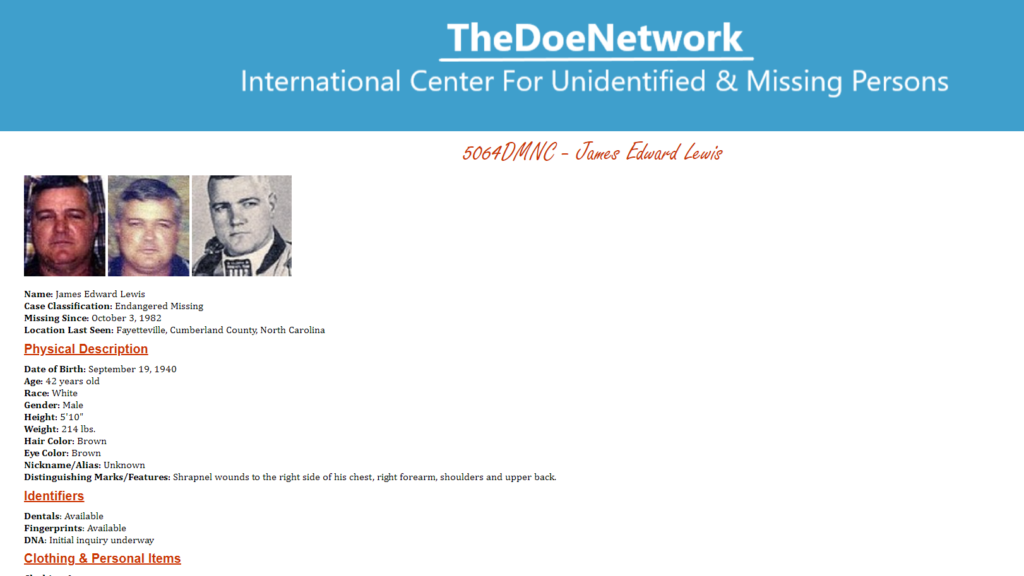A Facebook Post that Became Too Long for a Facebook Post
I started writing something for a Facebook group dedicated to cold cases. Within a few sentences, I saw that I was caught up in a logorrheic effort that wouldn’t work as a Facebook post. It repeats, though within a different frame, some parts of Disequilibria.
*
Hello, Fellow Cold-Casers!
I’m here for a few reasons and would like to put a few of them before the members of this new Facebook group.
First, a personal motivation that I share with many in this group: I have a loved one who has been missing many years. James Edward Lewis, my stepfather, a Vietnam veteran and pilot, disappeared in 1982. To date, there is no resolution, though there are fragments of information pointing in a certain direction.
My youngest brother and I have made a NamUs record for JE Lewis. He’s included as well in other online databases (Veteran Doe, for one).

James Edward Lewis’ NamUs file.
Second, as a writer and researcher, I’m interested fundamentally in the ways people create meaning and purpose. I’m also interested in how we get outside our own missions (or obsessions) to have conversation with other mission-driven, obsessed individuals – especially across differing sensibilities, beliefs, professions, ways of living, or cultural differences.
In something so abject, so uncanny as long-term disappearance, how do we create shared language, shard space, shared opportunity? It’s one of the promises of the digital world, of social media – one that mostly fails, I think. Perhaps in a particularly intense experience like missing persons, the promise will have more fulfillment.
Third, I’m interested in how people process missingness within their daily, yearly lives: how do you live with grief, ambiguous loss, doubt, anger, trauma, obsession, moving on, the effort at searching or waiting – or, alternatively, the refusal to let the experience take over one’s life?
Fourth, I’m interested in how the Internet, social media, technology, advances in professional practices, and scholarship, along with concomitant real-world changes (the increased number and kind of groups for support, search, advocacy, etc.) have altered the very nature of long-term missing persons (and the experience of missing persons generally – given that roughly 98% of reported cases are resolved in the short term, happily or tragically).
Anyway – here is a peek into my family’s own MP experience, with a focus on the possibilities of digital research, online happenstance, and sheer luck – or the rewards that sometimes come from desk-chair perseverance:
Over several years, my youngest brother and I have worked together – mostly through email and text— in searching for our father, JE Lewis (my stepfather, my brother’s biological father). My brother is a smarter, more active, methodical searcher; I focus on the philosophical meanings of the experience, I suppose.
Still, I am fascinated by the possibilities of digital searching. Some years ago, my brother, in his persistent Web browsing, found a message on the Websleuths forum that offered some digital-detective work on James Edward Lewis. The Websleuths poster had no direct involvement with Lewis or our family; they (I have only a screen name) had dug into some Archive.org-based FBI documents that mentioned details pointing (very indirectly and tentatively) to Lewis’ fate.

The Websleuths message-thread on Lewis.
“James Edward Lewis”: on the Internet, that combination of names leads a Googler to many, many results, and almost none of them about our James Edward Lewis. So, it was raw luck that led my brother to that Websleuths post.
Luck – and obsession, perseverance, love: there must be many names for the human and cosmic energies that organized themselves into the result, tenuous thought it is.
More to the point: how did we find a total, screen-name-only stranger online who had found clues to the possible fate of James Edward Lewis – central in our lives, but not to that Websleuths detective? What was JE Lewis to them except a small, deeply-hidden, but slightly-interesting puzzle to be solved?
In other words, framing it as a matter of virtuality-in-reality: One way to find a missing person might be to turn them into a computer game.
One dimension of true crime, including missing persons, is just that gaming aspect: that crime is entertaining, whether from prurience or true compassion. I think it is a necessary combination of both. The proliferation of podcasts on missing persons (Marissa Jones’s “The Vanished,” for one) reveals the complex spectrum between prurience and compassion.
After emailing the Websleuths detective, I went over to Archive.org myself to find that massive pdf of FBI documents. Digging further into the identity of the person who’d uploaded the FBI files, I found that the investigator, Emma Best, was a very adept and keen investigator who, as far as I can tell, frequently works on drawing out narratives of malfeasance, government and corporate ineptitude, and other complex, largely concealed trails.
Essentially, Best was very good at putting two and x together often enough to construct meaningful narratives within and through the digital gaps. Also, Best is very good at FOIA requests. I am not! – I lack the fortitude and the smarts.
Within those hundreds of pages of 1980’s era FBI-agent field notes, scraps, receipts, phone records, newspaper clippings, single, handwritten jots, and more, I found the closest thing we now have to an answer – though no answer, really; just a tingling suspicion about James Edward Lewis to carry into our sleep and dreams.
Best’s main focus in retrieving the documents was to put together a more thorough account of the life and death and goings-on of Andrew Carter Thornton II. I will not go down that very-deep rabbit hole in this post; if interested, Reader, please Google him yourself to find various documentaries, books, and web pages that lay out ACT’s story – one that might have served as inspiration for the new film (comedy, horror, comedy-horror, or something else? – I can’t tell from the trailer) called “Cocaine Bear.”

The tranche of FBI files at Archive.org
Within the tale of ACT II, the FBI notes tell the nested tale of another man, a friend of James Edward Lewis, whose name I’ll leave out of this post (you can find it in Disequilibria). Within that nested tale, I found – as had the Websleuths armchair detective, remarkably – a very small tidbit, names redacted:
“Lieutenant _____ CUMBERLAND COUNTY IDENTIFICATION DIVISION, Fayetteville, North Carolina, telephone number _____ advised _____ that [Lewis?], who was a certified flight instructor, was doing commercial flying for [Smith] for some time, but according to street word is missing due to crashing his airplane in a South American flight for [Smith]. [Smith] denies any knowledge of [Lewis?] and his demise.”
That’s it. One law-enforcement officer, “Lieutenant _____,” informed another (the first FBI agent), who then passed the information about [Smith, Lewis’ friend] to the FBI agent who wrote this note. In investigating Thornton, they also gathered information on [Smith], and through [Smith’s] case, recorded this small detail about [Lewis?].
But really, though the time frame (late 1982) was right, and the locale (Cumberland County, NC) was right, we don’t actually know that the redacted name is our stepfather, James Edward Lewis.
Looking at it now, I see a strange, delicate, emotional differential-calculus. It’s our complex desire for meaning in such a small jot, buried in the mass of documents hidden in the near-infinite, online abyss.
As far as I can tell, the two or three FBI agents whose names are not redacted in the files are long deceased. I doubt if I’d prevail in finding or interviewing them – although if they were still breathing, I bet my youngest brother would try.
Forty years after, this is as close as we’ve come to answers. It’s due to a poster at Websleuths, and the dogged investigative efforts of an investigative journalist — one who was not looking at [Lewis?] or [Smith] at all, but at the more-infamous AC Thornton II.
The world is made of rabbit holes, worm holes, black holes, crevices, folds, mise en abymes, vast open spaces, shadows, seas, deserts, mountains, skies, and outer space; and within/around it all, the persistent human mind and eye, ceaselessly searching – while awake and dreaming, both, when the heart demands it.

The Doe Network case file for Lewis
Individuals persist, but also, they reach out to each other. So far, those are the two most important qualities in cold-case work: persistence and collective effort.
And – well, having maybe a little smarts, or being close to someone else who has them.
One last point, regarding cold cases: To my family, James Edward Lewis was a good man. He was not only a Good Man, but a decorated, selfless, brave, wounded, tough, resilient, loving father, son, and husband. We don’t know that he was drawn into criminality; we know only that men like him – recently-retired or even active-duty soldiers, combat-hardened, restless in peacetime – have been tempted into risky business. Many missing persons cases are shadowed, or clearly marked, by criminality – drugs, violence, greed, lust, societal decay, various forms of venality and worse. How do we deal with that knowledge or those suspicions? Does any inkling of poor choices make the missing person less worthy of being sought, of being found?
Some are innocent – missing children, abused women, trafficked girls (and boys), people forced into being “mules,” people escaping impossible family circumstances. Innocence, or perceived innocence, indeed adds urgency and poignancy to the case.
But love, when it is love, is unconditional – isn’t it? We’ll keep looking for the missing, if they loved us, if we love them: the innocent, the maybe-guilty, the victimized, the merely-human – if someone, somewhere among the Left Behind keeps loving and looking.
0 Comments